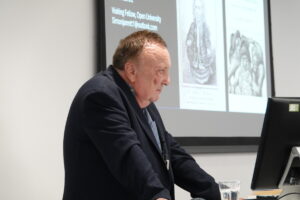Keynote speaker Simon Jarrett spoke about myths that have come to play an important role in the framing of the history of disability.
Having described some of these myths, he set against them some individual histories w hich give a very different, and sometimes very surprising, counterbalance to the version of history perpetuated by the myths. He questioned how and why these myths were constructed, what purpose they serve, why people are ready to believe them, and what effect they have. He related these myths not only to medical versions of the history of disability, but also to social and cultural versions of the history, where they survive and thrive to a surprising extent.
hich give a very different, and sometimes very surprising, counterbalance to the version of history perpetuated by the myths. He questioned how and why these myths were constructed, what purpose they serve, why people are ready to believe them, and what effect they have. He related these myths not only to medical versions of the history of disability, but also to social and cultural versions of the history, where they survive and thrive to a surprising extent.
Simon’s definition of disability for the purposes of the address was an omnibus including physical impairment, blindness, deafness, mental ill-health, learning disability and neurodiversity. Some of these would not have been recognised by any society before at least the first half of the twentieth century. “It is our choice to cast the net of our current characterisation of disability over the past.”
He discussed five topics, which he categorised as in some sense myths, about disability. While not denying they contained partial truths, he challenged their general veracity and significance and the use to which they have been put in constructing a certain harmful characterisation of disabled people and the motives for this construction.
The topics were clinical exactitude and precision about mental disability; past infanticide of disabled babies, going back to Oedipus; the myth of Bedlam as the archetypal site of incarceration of the insane; the idea of marginalisation in the pre-industrial period and finally the concept of the industrial revolution and the non-productive body.
He concluded that while there was no need for mindless icon-toppling in the history of disability, we should always challenge those beliefs which are presented as fact and remain acutely aware that they could be beliefs and not facts.
Simon Jarrett PhD is Visiting Fellow in the School of Health, Wellbeing and Social Care at the Open University. He is the author of Those They Called Idiots: The Idea of the Disabled Mind from 1700 to the Present Day and A History of Disability in England from the Medieval Period to the Present Day.
